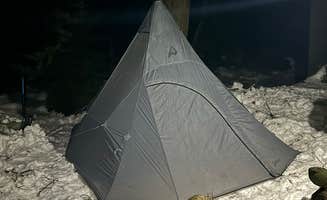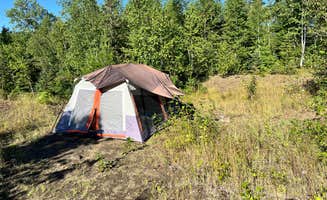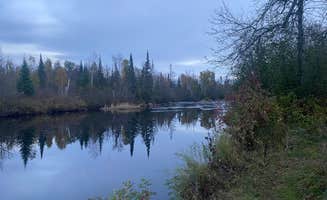Dispersed camping sites in the Chequamegon-Nicolet National Forest region offer backcountry experiences with minimal amenities. Most locations require a 20-30 minute drive on forest roads from Iron River, Wisconsin, where elevations range from 1,100-1,400 feet. Winter conditions often render many sites inaccessible from November through April, with snowmelt creating muddy access roads well into May.
What to do
Waterfall exploration: Foster Falls provides a natural attraction within walking distance of primitive campsites. "A short walk down to the waterfall. Quiet and serene, towering trees and only a few mosquitoes," notes Irvin N. about Foster Falls.
Mountain biking access: The FlowMama Trail Head serves as both a dispersed camping area and entry point to regional trail systems. "Nice clean and quiet site. No facilities or cell service. Easy access to mountain bike trails," reports Mike B. about FlowMama Trail Head Dispersed.
Wildlife observation: Northern Wisconsin forests host diverse wildlife including timber wolves, deer, and numerous bird species. Campers should practice proper food storage. "Got a bit nervous hearing timber wolves in the distance for a few hours at night then again in the early morning. But we practiced good camp hygiene and they left us alone," shares Michael G. from Foster Falls.
Paddling opportunities: Some dispersed sites offer water access for canoes and kayaks. "Upon reaching the end of the trail, there is a small dirt road that leads to a public Canoe/Kayak launch. No amenities, but you can filter your water," explains Peter L. about Carrol Truck Trail.
What campers like
Seasonal wildflowers: Primitive camping near Iron River includes meadow areas with seasonal blooms. "This is a beautiful, quiet spot at the end of a forest spur road. Surrounded by wildflowers in mid July," writes Joni Z. about Afterhours Meadow.
Solitude and privacy: Many sites receive minimal visitation, especially mid-week. "We had the place to ourselves. A short walk down to the waterfall. Quiet and serene, towering trees and only a few mosquitoes," mentions Irvin N. regarding their Foster Falls experience.
Natural camping surfaces: Sites typically feature level, natural surfaces rather than developed pads. "Easy to get level and ruin for several rigs," notes Joni Z. about Afterhours Meadow, though some locations present challenges as another camper points out: "Nice little field. Would be great if the ground wasn't all sticks and thorns."
Established fire rings: Many dispersed camping locations near Iron River contain stone fire rings from previous use. "There are a few spots you could camp with stone firepits. Didn't look to be visited often, but I came in winter," writes Skip H. about Castle Danger.
What you should know
Road conditions vary: Access to primitive sites requires navigating forest roads of varying quality. "This area is definitely off the beaten path. Super skinny road with lots of rocks/hills and puddles coming in. I would recommend a car with 4WD for it and would not suggest pulling a camper unless you have experience bringing it over rough terrain," warns Carissa J. about Castle Danger.
Insect preparation essential: Mosquito and tick populations can be substantial, particularly May through August. "Very buggy (mosquitos, ticks), no cell service. BRING BUG SPRAY! The mosquitoes are no joke," emphasizes Anna P. about Carrol Truck Trail.
Limited site availability: Most dispersed areas contain only a few established camping spots. "Approx three spots for tents or cars/trucks/vans, not suitable for larger vehicles," notes Anna P. regarding Carrol Truck Trail, while another camper adds: "There are 3 campsites at the end of the road where the GPS takes you. There are a few other pull offs along the way."
Cell service limitations: Communications connectivity is minimal to non-existent at most primitive camping locations. "ATT with my external antenna was great," reports one Afterhours Meadow visitor, but this represents an exception rather than the norm for the region.
Tips for camping with families
Consider site restrictions: Some primitive areas near Iron River have specific limitations. "No marked sites or mowing/trimming done that we could find. There's a shooting range that is not marked as such and we didn't realize that's what it was until we had already camped," shares Chelsea N. about Carrol Truck Trail.
Prepare for wildlife encounters: Families should establish protocols for potential wildlife sightings. "Couple fire pits already built. No bugs! Lots of wildlife for sure. But a pack of yoties or wolves was making our dog very alert they ran right next to us when we had our fire going," recounts Jasmine L. from Carrol Truck Trail.
Pack sufficient water: No potable water exists at these primitive sites. "River access," notes one Carrol Truck Trail reviewer, but families should either bring all needed water or pack purification equipment for surface water sources.
Scout clearings for tents: Families requiring multiple tents should target meadow areas. "Easy gravel road to the pin, there is one or two small sites on the left side of the road but we turned right and went down the 2 track (which was fine in 2wd vans w low clearance) and you end up in a big clearing," advises Liona L. about Afterhours Meadow.
Tips from RVers
Size limitations: Most dispersed camping areas near Iron River accommodate smaller recreational vehicles only. "Small parking lot located off well-maintained gravel roads. Nice and quiet flat no facilities," reports Chris P. about FlowMama Trail Head.
Ground firmness varies: Seasonal conditions affect parking surface stability. "Boondocking great spot! Drive back in to open field," notes Emma A. about Afterhours Meadow, though specific ground conditions may change with weather and seasons.
Limited turnaround space: Forest roads often lack adequate space for larger RVs to turn around. "There are low sites, and if you have 4x4, you can drive up to another plateau of sites," explains Skip H. about Castle Danger, indicating the terrain challenges present at many dispersed camping locations.
Distance from services: All primitive camping requires self-sufficiency. "8 Mile drive off the main road. Mostly paved, some gravel, but all smooth," details Irvin N. about Foster Falls, highlighting the isolation factor RVers must consider when planning water, waste, and supply needs.




